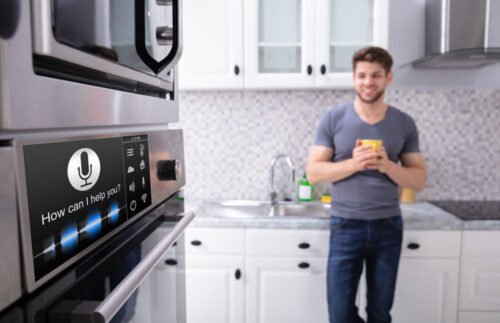How IoT-enabled Devices Change Product Development
 Imagine a home that anticipates your every need. The front door unlocks the moment you approach, your fridge tells you when you’re low on certain foods, and the bathroom mirror analyzes your skin for health changes. It sounds like science fiction, right?
Imagine a home that anticipates your every need. The front door unlocks the moment you approach, your fridge tells you when you’re low on certain foods, and the bathroom mirror analyzes your skin for health changes. It sounds like science fiction, right?
According to Berg Insight, a Swedish research firm, about 63 million homes in the United States alone will operate similarly as soon as 2022. Thanks to incremental improvements in the field of artificial intelligence (AI), homes in the near future will continuously learn more about their occupants. These learnings include things like their hobbies and the state of their health, and many future homes may even be able to anticipate their occupants’ needs.
A key component to these tech advancements in smart home products is the Internet of Things (IoT). The IoT consists of physical devices that are connected to the internet. Often referred to as “smart” or “connected,” the devices collect and share data using sensors, processors, and communication hardware. Combining these connected devices with automated systems and AI makes it possible to gather information, analyze it, and create an action to help someone with a task or learn from a process.
What Is Smart Home Technology?
Smart home technology is the general term given to basic home amenities that have been fitted with communication technology, enabling some degree of either automation or remote control. It includes things like:
- Appliances, such as washing machines, fridges, and garage door openers
- Home entertainment systems
- Home security systems and door locks
- Environmental controls, such as air conditioning, heating, and lighting
It also includes the various Internet of Things devices that regulate and control all these products from companies such as SiliconLabs, Lutron, and Control4. These are systems that unite all your smart devices and give you one node to access everything. These systems usually come with a mobile software or app that can be controlled from wherever you want in the house or when you’re out and about.
Smart, connected devices are everywhere from smart cities, to smart cars, to smart manufacturing. This is driving consumers to expect more connectivity and smart functionality in their everyday lives. Home automation has been projected to target a wide array of consumer products with IoT-enabled connectivity, including:
- Lighting control
- HVAC
- Lawn/gardening management
- Smart home appliances
- Improved home safety and security
- Home air quality and water quality monitoring
- Natural language-based voice assistants
- Better infotainment delivery
- AI-driven digital experiences
- Smart switches
- Smart locks
- Smart energy meters
How Smart Home Technology Is Shaping Our Lives
 The streamlined capability of controlling multiple aspects of your home saves a vast amount of time and offers you increased peace of mind. For the many people who simply don’t have enough hours in the day to complete tedious tasks around the home, this is a godsend.
The streamlined capability of controlling multiple aspects of your home saves a vast amount of time and offers you increased peace of mind. For the many people who simply don’t have enough hours in the day to complete tedious tasks around the home, this is a godsend.
Furthermore, the integration of these smart technologies and IoT, in general, has benefitted those with disabilities greatly. People suffering from visual impairments, for example, can now employ alternative methods of operating their homes via voice-activated systems.
The constant advancement of smart home technologies and their improving affordability means that IoT will continue to shape our lives for years to come. As smart home technology adoption increases and further innovations occur, more people will experience the associated benefits. It’s important for the companies developing these products to keep up with the ever-evolving consumer thirst for connected, smart products. These companies will need solid product development processes to remain innovative and competitive.
How Companies Are Developing IoT-Enabled Products
IoT or smart devices are comprised of the following:
- Hardware
- Software/apps
- Sensors
- Communication protocols (e.g., Bluetooth)
Each of these parts is equally important in building a truly smart home experience for your customers. Having the right hardware enables your IoT prototype to iteratively respond to technology pivots with ease.
The companies that are developing smart home devices need the ability to scale to meet growing consumer demands. However, these smart home devices are becoming more and more challenging to design. Current and future smart home products combine electronic components, software, and sensors into one highly sophisticated product.
As smart home products become increasingly advanced, manufacturers and their supply chain partners must have a single product development system to keep everyone on the same page and ensure interoperability while reducing errors and product launch delays. The pressure to get innovative products to market fast requires transparent, real-time collaboration throughout the new product development and introduction (NPDI) process.
IoT Products and Arena: Better Together
 Arena supports your smart home device product development success. Our software solutions enable you to deliver dynamic home automation products quicker as dispersed teams interact from concept through product launch. Arena’s scalable, cloud-based product lifecycle management (PLM) solution helps centralize your product information and enable cross-functional collaboration anytime and anywhere.
Arena supports your smart home device product development success. Our software solutions enable you to deliver dynamic home automation products quicker as dispersed teams interact from concept through product launch. Arena’s scalable, cloud-based product lifecycle management (PLM) solution helps centralize your product information and enable cross-functional collaboration anytime and anywhere.
By providing controlled access to complete product information, including released revisions, pending changes, and past revisions, your product team members have the information they need at their fingertips. With Arena, your team can manage changes to your product record to ensure the product specifications, design, assembly instructions, test procedures, and packaging instructions are in sync and ensure that these changes become part of the product record.
Arena PLM is designed for complex technology products. Whether you’re new to the world of designing IoT-enabled products or developing your next generation, you need solid design and development processes to ensure product launch success. Learn more about how Arena can help uplevel your smart home technology product development today.


